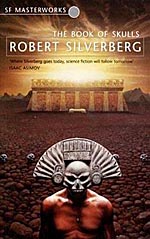
![]() pleb
pleb
8/10/2009
![]()
I am putting myself in the uncomfortable position of arguing that The Book of Skulls is not only science fiction, but a very good piece of science fiction. This is going to be a tough case, for a novel that seems more like the traditional ghost story or psychological thriller than what many recognise as sci-fi. However, I am motivated by more than contrariness, although I feel compelled to rebuke all those on amazon.com, who titled their reviews along the lines of �Science Fiction? BS!" The thrust of my argument here is in my view central to distinguishing between the good and the bad in SF.
If your definition of "Science Fiction" means far-fetched, yet oddly familiar heroism involving pointless space travel, dull robots, or implausible extra-terrestrials, then avoid this. If by "Science Fiction" you mean the author takes an incredible premise and, rather than endlessly attempting to account for such a possibility scientifically, develops the characters and investigates their motivations, then The Book of Skulls is for you. Silverberg makes a mammoth task for himself, with a difficult premise, sordid plot and tricky format, yet he pulls it off effortlessly. He explores the relationships between four archetypal, but believably-rendered young men as they go on a road trip in search of a mysterious and ancient cult, told from each boy�s perspective, with a narrative that switches between them from chapter to chapter. Silverberg is unafraid to explore the tricky territory of these young men�s sex lives, but succeeds, even with a sympathetic and frank portrayal of its gay characters � a far cry from the seedy machismo of some contemporaries.
The cult the boys seek offers eternal life, but with a catch: two of the four novices must die so that the remaining two shall have eternal life. The end is therefore written from the start, as in Downward to the Earth, and again, there�s a faint feeling of anticlimax as we see the predestined come true. And OK, there�s only the briefest attempt to rationalise all this scientifically, but at the same time, it�s set in a real world, one where nothing supernatural is seen to occur. So we are left to wonder what we have read: we are left with no firm answers about the source of the cult�s immortality; we wonder whether it is true immortality that they achieve; whether the seemingly fated death of the two dead boys was truly destined to occur; in fact, were the deaths even truly necessary? Good science and good fiction raise more questions than they answer; this book is a compelling thought experiment about something supernatural occurring in the real world and therefore The Book of Skulls is good. science. fiction.